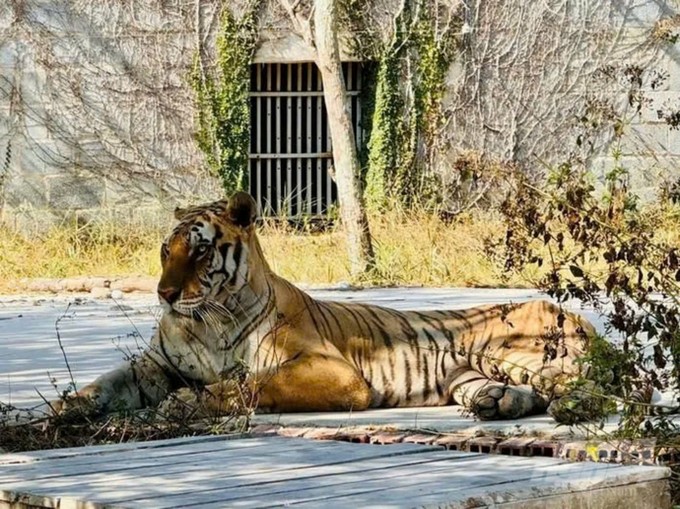November 28, 2025 | 03:47 GMT +7
November 28, 2025 | 03:47 GMT +7
Hotline: 0913.378.918
November 28, 2025 | 03:47 GMT +7
Hotline: 0913.378.918

The captive Bengal tiger that has just gone through the illness is recovering. Photo: H. Phuc.
According to test results of the National Centre for Veterinary Diagnosis, two tiger samples (including blood and viscera) taken on September 22 for testing have now tested positive for the H5N1 virus.
Doctor Phan Van Phuc, Head of the Department of Infectious Diseases Prevention and Control under the Center for Diseases Control of Dong Nai Province, said that on October 2, when working with representatives of the Mango Garden tourist area, he knew that before showing signs of infection and death, many tigers here had eaten chicken meat and chicken heads. This food was provided by a company located in Ho Nai ward, Bien Hoa city.
According to Dr. Phuc's judgment, it is likely that the tigers died due to being infected with the H5N1 virus from infected chicken meat. Therefore, functional agencies are tracing the origin of chicken meat to clarify the source of infection. From there, have solutions to localize, suppress the epidemic, and prevent its spread.
Explaining why the whole streak of tigers ate chicken meat but some died and some were still alive, Dr. Phuc said: It was possible that in the chicken flock of the unit supplying the Mango Garden tourist area, there were some infected animals and some uninfected animals. Therefore, any tiger that eats infected chickens will get sick and die. Any tiger that eats uninfected chickens is still healthy. Therefore, on this day (October 3), functional forces of Dong Nai province will trace the origin of chicken supplied to the Mango Garden tourist area.
H5N1 is a type of influenza A virus capable of causing dangerous infectious diseases in poultry. That's why H5N1 is also called avian influenza. Influenza A/H5N1 can be transmitted from poultry to humans. When infected, the mortality rate can be up to 60%. The H5N1 virus can infect and cause illness in humans when we have contact with infected poultry without protective measures.
Therefore, humans can be infected when contacting and touching diseased poultry; touching or inhaling secretions of diseased poultry; or contacting (slaughtering, processing with infected meat sources; eating undercooked poultry meat or eggs). There is currently no specific treatment for avian influenza in humans, nor is there a vaccine to prevent the disease.
Translated by Thu Huyen

(VAN) On November 27, in the meeting with Minister Tran Duc Thang, Mayor Yin Yong shared Beijing’s experience to improve environment and air quality.

(VAN) After 30 years, both sides identified strategic areas of cooperation: sustainable production, increasing coffee value and training for farmers.
/2025/11/27/4910-4-164708_294.jpg)
(VAN) On the afternoon of November 27 in Beijing, Minister of Agriculture and Environment Tran Duc Thang held a working session with several major Chinese enterprises operating in the agriculture and environment sector.

(VAN) The Department of Animal Health issued a provisional guideline requesting local authorities to increase surveillance, collect samples for testing, and conduct epidemiological investigations according to the established procedure.

(VAN) The United Nations recommends that Vietnam utilize data and artificial intelligence to enhance early disaster warnings and reduce GDP losses by 3.2% in the context of climate change.

(VAN) On the morning of November 27 in Beijing, Minister Tran Duc Thang and the Deputy Commissioner General of the General Administration of Customs of China signed a protocol on fresh jackfruit exports.

(VAN) As floodwaters recede, a vast network of irrigation works across eastern Gia Lai is emerging in a state of severe disrepair, with extensive damage demanding urgent restoration ahead of the 2025-2026 winter-spring cropping season.